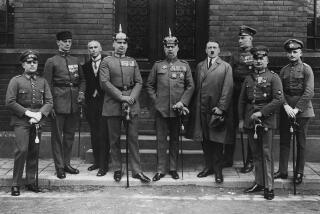E. German Stasi Chief on Trial; Political Error Seen : Justice: The spectacle seems an embarrassment. The murder charges predate communism’s rise.
- Share via
BERLIN — After months of anticipation and controversy, the first trial of a senior Communist leader opened here Monday with Erich Mielke, the chief of the infamous East German secret police, facing charges of murder.
But the much-awaited spectacle seemed more a pathetic embarrassment than a dignified legal process.
Mielke’s failing health, his advanced age and questionable mental coherence--plus the fact that the murder charge against him stems not from the Communist era but from the chaotic final phase of the Weimar Republic more than 60 years ago--combined to raise basic questions about the trial.
“It is a major political mistake to put this man on trial,” declared Hubert Dreyling, one of Mielke’s three defense attorneys. “It is wrong even to begin these proceedings.”
Certainly there is no doubt that Mielke, now 84, was a key figure in Eastern Europe’s most tightly controlled dictatorship.
He built and, until the end, ran the Communist Bloc’s most pervasive internal security network, the Stasi--a network that kept files on one-third of the East German population and turned husband against wife, father against son and friend against friend, all in the name of ferreting out enemies of the little-loved Communist state.
He is said to have enjoyed the nickname Chekist, a reference to the brutal Bolshevik secret police that spread terror in the early years after the Russian Revolution. He is widely seen as responsible for the mixture of blackmail and fear that ran as an undercurrent throughout East German society.
“Finally, one of the big Communist criminals is in court,” commented the mass circulation German daily Bild Zeitung in an editorial published Monday. The paper’s lead story reported an alleged plot by former Stasi members to kidnap their leader and spirit him away to safety.
In some ways, the desire to get a leading member of the East German hierarchy to trial reflects views within Chancellor Helmut Kohl’s government. Officials here have been embarrassed by charges that the courts have gone after former East German border guards in their 20s for shooting fellow citizens as they tried to flee to the West but have yet to try those who formulated the shoot-to-kill policies and issued the orders.
On Monday, however, several factors dampened the desire for accountability. For example, it was unclear to those sitting in the crowded central Berlin courtroom whether Mielke was capable of understanding what was happening.
Although responding with “ja” when asked if he was Mielke, he appeared unwilling or unable to provide his date of birth or to answer further questions by presiding judge Theodor Seidel.
Barely visible much of the time, Mielke sat in a glass booth hunched under a brown hat. Occasionally he slumped forward so far that his head virtually disappeared under the booth’s wooden base. At one point, he lifted his head and appeared about to fall over backward.
Defense lawyers sitting directly in front of him nervously checked their client to ensure that he was still upright, and, on two occasions, proceedings were interrupted for medical checks.
As one defense lawyer read an opening statement, Mielke blurted out, “I feel absolutely terrible!” Minutes later, he declared, “I want to go home.”
A court-appointed medical team has declared that Mielke, who is suffering from cancer and heart trouble, is fit for two, 1 1/2-hour sessions per week. As the first day in court drew to a close on Monday, the defendant sat, head bowed, leaning forward with only a cane preventing him from collapsing onto the floor.
According to various news accounts, Mielke is said to spend much of his time in judicial custody talking into a disconnected telephone, giving orders to fictitious people or asking about his beloved dog, a Yorkshire terrier, “Airena.” In a rare but brief interview with the leading news weekly Der Spiegel last month, Mielke responded to the question of whether he feels he is guilty with the words, “I want to go back to bed.”
Equally disturbing for some is the fact that Mielke is charged with the killings of two policemen that occurred 61 years ago; Communists and Nazis often engaged then in street brawls. Mielke and another Communist Party member were accused of being the key figures in the August, 1931, killing of two Berlin police officers in revenge for the street death of a Communist in an earlier demonstration.
The charges, initially dropped for lack of evidence, were revived after the Nazis came to power in 1933. In part, the case against Mielke is anchored in evidence gathered in 1933 and 1934 by the Nazi secret police, the Gestapo. The case was suspended after he fled to the Soviet Union in 1934 but was reopened after Communist East Germany collapsed two years ago.
In opening arguments Monday, Mielke’s defense lawyers claimed that many witnesses at the 1934 trial were beaten into confessions. In their remarks, Mielke’s lawyers argued for immediate dismissal on grounds that the crime was beyond the statute of limitations, that Mielke was medically unfit to stand trial and that a fair trial was impossible after such a long period of time.
The killings occurred before four of the five judges hearing the case were born.
More to Read
Sign up for Essential California
The most important California stories and recommendations in your inbox every morning.
You may occasionally receive promotional content from the Los Angeles Times.













